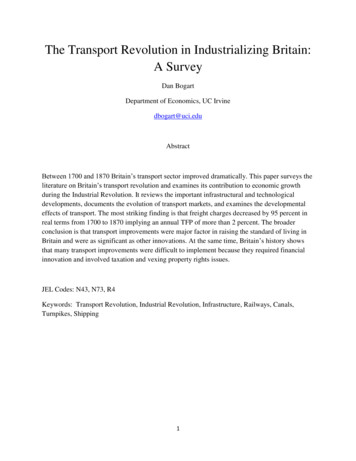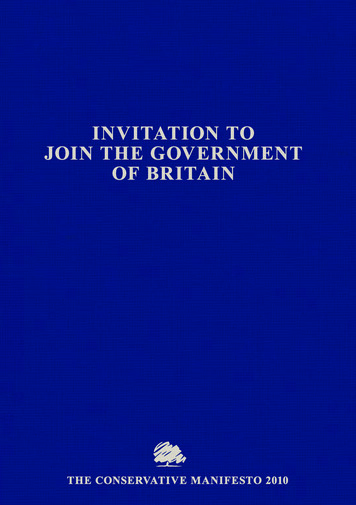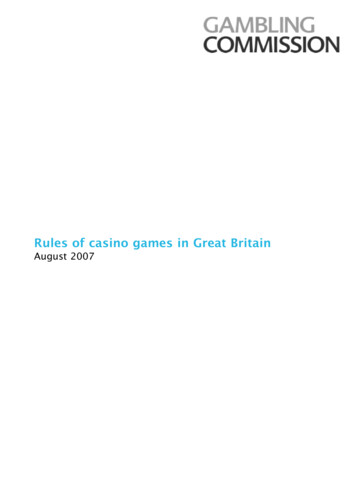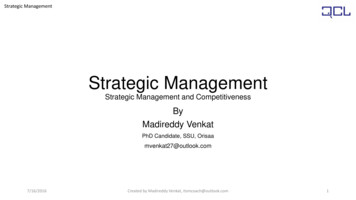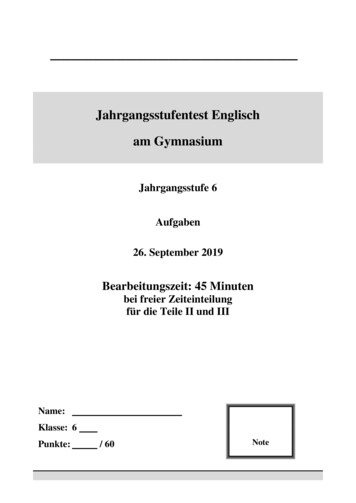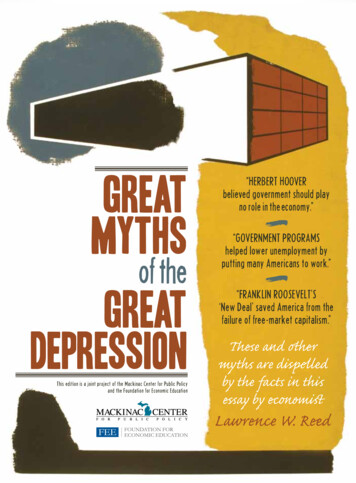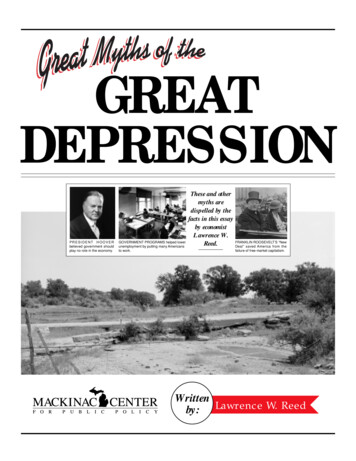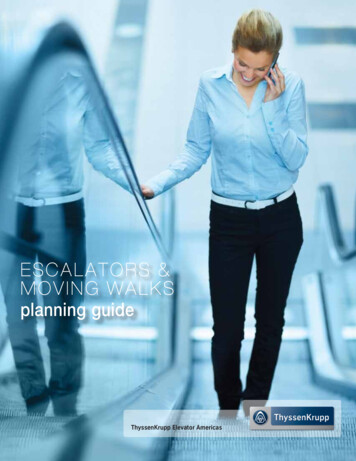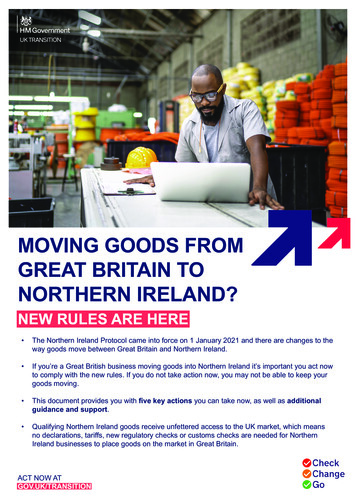
Transcription
MOVING GOODS FROMGREAT BRITAIN TONORTHERN IRELAND?NEW RULES ARE HERE The Northern Ireland Protocol came into force on 1 January 2021 and there are changes to theway goods move between Great Britain and Northern Ireland. If you’re a Great British business moving goods into Northern Ireland it’s important you act nowto comply with the new rules. If you do not take action now, you may not be able to keep yourgoods moving. This document provides you with five key actions you can take now, as well as additionalguidance and support. Qualifying Northern Ireland goods receive unfettered access to the UK market, which meansno declarations, tariffs, new regulatory checks or customs checks are needed for NorthernIreland businesses to place goods on the market in Great Britain.ACT NOW ATGOV.UK/TRANSITION
The Department for Business, Energy & Industrial Strategy has produced a video whichexplains the key changes to moving goods into, out of, or through Northern Ireland, and thesupport available for traders. Watch it here. The latest guidance on the Northern Ireland Protocol can be found atwww.gov.uk/northern-ireland-tradeREGISTER FOR THE TRADER SUPPORT SERVICEThe Government has launched the Trader Support Service (TSS) – a free-to-use service that helpsbusinesses and traders of all sizes to navigate the changes to the way goods move between GreatBritain and Northern Ireland which apply now that the Northern Ireland Protocol has come intoeffect.The TSS enables you to: complete declarations without the need for specialist advice or software get information and advice about moving goods between Great Britain and Northern Irelandthrough free online courses and training materials access help and support through a dedicated contact centre.The service uses the information you provide to submit customs and safety and securitydeclarations on your behalf.Find out more and sign up now at www.gov.uk/tradersupportserviceGET AN EORI NUMBERIf you move goods between Great Britain and Northern Ireland, and you do not already have anEORI number you should apply for one now. You need an EORI number that starts with XI to: move goods between Great Britain and Northern Ireland move goods between Northern Ireland and non-EU countries make a declaration in Northern Ireland get a customs decision in Northern IrelandTo get an EORI number that starts with XI, you must already have an EORI number that starts withGB. For information on what an EORI is and how to get one, visit www.gov.uk/eori. It takes 5 to 10minutes to apply.ACT NOW ATGOV.UK/TRANSITION
CHECK YOUR COMMODITY CODESTo understand any duty or other measures that apply to your goods, you’ll need to find the rightcommodity code when you bring goods in or send goods out of Northern Ireland. You also need acommodity code to fill in declarations and other paperwork. you can search the Trade Tariff tool to find the right commodity code for goods you purchase, you should speak to your supplier, they may be able to tell you thecodeCHECK WHETHER THE UK TRADER SCHEMECOULD HELP YOUR BUSINESSWhile the UK-EU Trade and Cooperation Agreement delivers zero tariffs on imports and exports,there are some instances where duty may be due.If you bring goods into Northern Ireland from Great Britain or a country outside of the EU, you willneed to make declarations and may be liable to pay EU customs duty.Whether you have to pay a duty, and how much that duty is, will depend on where you are bringingthe goods from and whether they are ‘at risk’ of onward movement to the EU.If you intend to bring goods into Northern Ireland which you know are not ‘at risk’ of moving to theEU, then you can apply for authorisation under the UK Trader Scheme. Find out more on how todeclare your goods not at risk here.CHECK GOODS REGULATION: MANUFACTUREDAND AGRI-FOOD GOODSManufactured goods When placing manufactured goods on the Northern Ireland market, you will need to ensurethat these goods meet the relevant EU rules that apply. For example, many consumer and commercial products will need to have a CE marking andyou will need to check your legal responsibilities if you are bringing goods into Northern Irelandfrom Great Britain for the first time. What you need to do will depend on the type of goods you are placing on the market. Furtherguidance can be found here.ACT NOW ATGOV.UK/TRANSITION
Agri-food goods If you move certain agri-food goods (including but not limited to live animals, products of animalorigin, organic products and plants and plant products) from Great Britain to Northern Irelandthere are new rules you need to follow. Depending on the type of goods you are moving, youmay need to obtain certificates such as an Export Health Certificate (EHC), a PhytosanitaryCertificate (PC) or a Certificate of Inspection (CoI). Free support, including a dedicated helpline, is available for traders and businesses from theMovement Assistance Scheme. Advisors are available on 0330 0416 580, Monday to Friday,9am to 5pm (excluding bank holidays). The Movement Assistance Scheme also provides financial support to traders. You will not becharged for certain certification costs. For EHCs, certifiers should invoice the Government up to a set amount (subject to current capsof 150 excl. VAT for non-equine EHCs and 500 excl. VAT for equine EHCs). Certifiers ofEHCs will need to register on EHC Online before submitting a claim for reimbursement. The scheme also covers movements of goods to Northern Ireland via Ireland. The Government continues to monitor the performance of MAS to determine how to bestprovide ongoing support to traders and will announce any further updates to the scheme whenappropriate. Find the most up to date guidance on the scheme here.ADDITIONAL GUIDANCEVAT on goods sold between Great Britain and Northern Ireland For goods sold between Great Britain and Northern Ireland, VAT will continue to be accountedfor as it is currently. This means that the seller of the goods will continue to charge its customers VAT and should show this on its invoices. The VAT charged will be accounted for as outputVAT on the VAT return, in the same box as it is now. The seller will not be able to claim thisback as input VAT. Where the customer receives an invoice from the seller showing that VAT has been charged, itmay use this as evidence in order to reclaim the VAT as input VAT, subject to the normal rules. There are a small number of exceptions to this. Find out more about accounting for VAT ongoods moving between Northern Ireland and Great Britain. Businesses involved in trading goods between Northern Ireland and the EU, will need to add‘XI’ prefix before their normal 9 digit UK VAT number when communicating with EU suppliers orcustomers. Further guidance on the use and application of an ‘XI’ prefix is available here.ACT NOW ATGOV.UK/TRANSITION
Parcels If your business sends parcels from Great Britain to Northern Ireland, you can find the latesttemporary arrangements for express carriers and Royal Mail here. In practice, the temporary measures mean that most parcels will continue to be able to movefrom Great Britain to Northern Ireland exactly as they did prior to 1 January 2021, for a furthertemporary period of time.Moving goods from Great Britain to Northern Ireland via Ireland The processes for moving goods from Great Britain to Northern Ireland via direct and indirectroutes are different. Hauliers moving goods from Great Britain to Northern Ireland via Ireland can do so in only twoways: Using Transit to move goods through Ireland By exporting to Ireland and entering the goods into free circulation on the island of Ireland The Trader Support Service can support traders with the requirements of the Transit process tohelp ensure hauliers are able to transport your goods. Further information on GB-RoI-NI transitmovements can be found here and via TSS. All goods moving from Northern Ireland to Great Britain via Ireland will require declarationsas they are moving through the EU. TSS can also support traders with this process. Furtherguidance can be found here. Moving goods from Great Britain to Northern Ireland via direct export to Ireland follows thesame procedures as a standard export to the EU. After goods have cleared customs in Irelandthey can be freely moved into NI. TSS does not support traders with this process and aseparate customs agent may be required. Find out more about exporting goods from the UKhere.Rules of origin If you bring goods into Northern Ireland from Great Britain or a country outside of the EU, youmay be liable to pay EU customs duty if your goods are ‘at risk’ of onward movement to theEU. Rules of Origin are used to help you work out which preferential tariff rates, or other specificmeasures, apply to qualifying goods. Check if your goods meet the rules of origin and helpidentify those which qualify for lower or nil Customs Duty here. Goods that can be proved to be of UK origin under the UK-EU Trade and CooperationAgreement (TCA), can claim preferential tariffs if moved directly from Great Britain to NorthernIreland. The Trader Support Service offers further resources on Rules of Origin that can be found here.ACT NOW ATGOV.UK/TRANSITION
Environmental standards The implementation of the Northern Ireland Protocol means there are some changes to themovement of goods between Great Britain and Northern Ireland with regards to environmental standards. This includes changes for business which move chemicals, F gas, waste andCITES-listed specimens. Businesses which make, sell or distribute chemicals in Great Britain need to follow the UK’snew domestic chemicals regulations, including UK REACH, while Northern Ireland businessescan continue to use EU REACH. Northern Ireland notifications will enable ongoing GreatBritish market access for existing EU REACH registrations of qualifying Northern Ireland goods(QNIGs), however, Great British traders need to submit some information on the substancesthey source from Northern Ireland. The Comply with UK Reach service is now live and detailedguidance is available on the Health and Safety Executive website. If your business moves HFCs (the most common type of F gas) from Great Britain to NorthernIreland, you must comply with EU quota and registration requirements and include movementsto Northern Ireland in your annual GB HFC report. Find more information here. The EU Regulation on Waste Shipments will continue to apply in Northern Ireland for the duration of the Northern Ireland Protocol. This means that if you transport waste from Great Britainto Northern Ireland you will need to comply with the EU waste shipment controls. Find moredetailed guidance here.When you move CITES specimens from Great Britain to Northern Ireland, and from NorthernIreland to Great Britain, customs checks will take place in Northern Ireland. This means youcan use any point of exit from Great Britain, but you must use a CITES-designated point ofentry and exit in Northern Ireland. You must apply for a permit or certificate to import, exportor re-export any animal or plant species that are on the CITES list between Great Britain andNorthern Ireland, as well as their parts or derivatives. Find more information here.Medicines and healthcare The Northern Ireland Protocol provides provisions for the continued supply of medicines fromGreat Britain to Northern Ireland, but there are some changes that suppliers and manufacturersshould be aware of. In particular, there are changes to the steps businesses need to take tomove goods from Great Britain to Northern Ireland. Find more information here.ADDITIONAL SUPPORTThe Trader Support Service provides free online courses and training materials for businessesmoving goods between Great Britain and Northern Ireland, as well as enabling businesses tocomplete declarations without the need for specialist advice or software.Smaller businesses can also apply for grants of up to 2,000 through the SME Brexit SupportFund to adapt to new customs and tax rules. These grants enable traders to access practicalsupport, including training or professional advice. Businesses must import or export goodsACT NOW ATGOV.UK/TRANSITION
between Great Britain and the EU, or move goods between Great Britain and Northern Ireland.More information about the SME Brexit Support Fund, including details of how to apply, can befound here.ACT NOW ATGOV.UK/TRANSITION
The Government has launched the Trader Support Service (TSS) - a free-to-use service that helps businesses and traders of all sizes to navigate the changes to the way goods move between Great Britain and Northern Ireland which apply now that the Northern Ireland Protocol has come into effect. The TSS enables you to:
